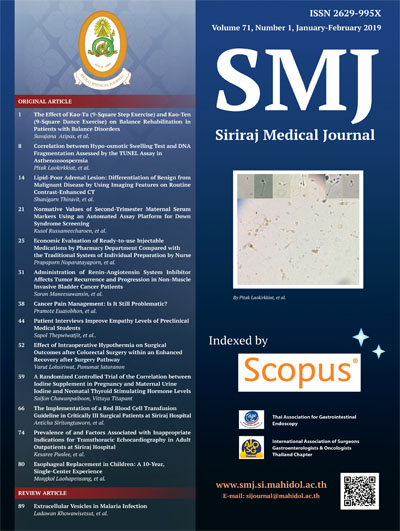Patient Interviews Improve Empathy Levels of Preclinical Medical Students
DOI:
https://doi.org/10.33192/Smj.2019.08Keywords:
Empathy; preclinical medical student; experiential learning; patient interviewAbstract
Objective: In order to cultivate and maintain empathy during medical school, an experiential learning program, “A
Patient as a Human Being”, was designed to promote empathy in second-year medical students through interviews
with patients focusing on their suffering and the difficulties arising from their illnesses and hospital stays.
Methods: The second-year medical students were divided into groups of three and four. Each group was assigned
a patient to interview under close supervision. The selected patients were informed beforehand about the interview
and voluntarily agreed to participate. The Thai version of the Jefferson Scale of Physician Empathy–Student Version
(JSPE-SV) was used to assess the students’ empathy levels.
Results: The baseline JSPE-SV score (n = 310) was 114.10±10.20. After the interview, the scores significantly increased
(1.19 [0.21-2.18], P = 0.009). Students in the lower-half group of baseline scores showed a higher improvement (2.64
[1.14–4.15], P < 0.001) than those in the upper-half group. The difference coefficient by multivariate analysis of the
improved JSPE–SV scores between the two groups was 3.03 [1.08-4.98] (p = 0.002), accompanied by a correlation
between the pre-activity empathy score and the improved score ( p = - 0.21, P-value < 0.01).
Conclusion: The patient interviews improved the empathy levels of the preclinical medical students, especially
those with lower baseline empathy levels.
Downloads
Published
How to Cite
Issue
Section
License
Authors who publish with this journal agree to the following conditions:
Copyright Transfer
In submitting a manuscript, the authors acknowledge that the work will become the copyrighted property of Siriraj Medical Journal upon publication.
License
Articles are licensed under a Creative Commons Attribution-NonCommercial-NoDerivatives 4.0 International License (CC BY-NC-ND 4.0). This license allows for the sharing of the work for non-commercial purposes with proper attribution to the authors and the journal. However, it does not permit modifications or the creation of derivative works.
Sharing and Access
Authors are encouraged to share their article on their personal or institutional websites and through other non-commercial platforms. Doing so can increase readership and citations.















